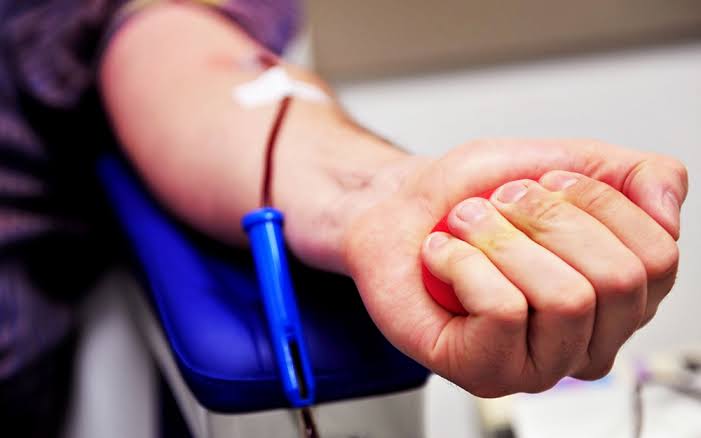Prof Vincent Osunkalu, consultant haematologist and blood transfusionist at the Lagos University Teaching Hospital (LUTH) Idi-Araba, says blood donation can reveal potential health problems.
Osunkalu said this on Tuesday, in his keynote address at a programme to mark the Lagos University Teaching Hospital 2022 World Blood Donor Day.
Osunkalu said that while blood donation was not the same thing as a trip to the doctor, it could be another way to keep an eye on your cardio-vascular health.
He said that the donor would receive a mini-physical examination prior to the blood draw, during which the pulse, blood pressure, body temperature, haemoglobin and more would be checked.
“This can sometimes shed light on issues you didn’t even know about before it becomes life-threatening.
“Giving blood can reduce harmful iron stores. One in every 200 people in the U.S. is affected by a condition called hemochromatosis, which most of them don’t even know about it.
“Hemochromatosis is a disease that causes an iron overload and is labelled as the most common genetic disease among Caucasians.
“Giving blood may lower your risk of suffering a heart attack, donating blood at least once a year could reduce your risk of a heart attack by 88 percent, according to a study conducted by the American Journal of Epidemiology.
“Giving blood may reduce your risk of developing cancer. Phlebotomy (the process of drawing blood) was found to be an iron-reduction method that is associated with lower cancer risk and mortality, “he said.
Osunkalu said that giving blood could also help someone’s mental state.
According to him, while there are several physical benefits to donating blood, the most powerful health benefit is arguably in the psychological realm.
He said that donating blood meant helping someone or some people somewhere in need of blood desperately.
“Volunteering has been shown to have positive effects on happiness. In people of over 65 years old, volunteering also reduces the risk of depression and loneliness.
“Some researchers have opined that the psychological health benefit you receive from knowing you are helping others is just as helpful as the physical health benefit.
“Blood donation benefits everyone, the health benefits of donating blood are considerable—but of course, the most important part of the process is helping to save lives.
“Donating blood is good for you, and it’s even better for all the people who desperately need the help,” he said.
The expert said that one of the major challenges associated with blood donation in Nigeria was the unavailability of blood banks.
He said that other challenges include, poor blood bank maintenance, and challenges from commercial blood donors.
According to him, commercial blood donors are those who prefer to donate blood to get paid.
Osunkalu said that this class of people was prone to indulging in certain risky behaviours to help them meet the blood donation requirements.
He said that one of the major blood donation challenges posed by commercial blood donors was blood doping.
According to him, doping is the act of manipulating your haemoglobin concentration to appear higher than normal even when you have donated more blood than you can at that time.
He explained that blood doping involves the use of erythropoietin; a glycoprotein hormone that stimulates the production of red cells.
Osunkalu said this act was also popular among sportsmen and women, who are trying to boost their performance.
He said this was not a good practice, as it results in the over-working of one’s blood-producing cells in the bone marrow predisposing you to many health risks.
He said that the basis criteria for donors were 18 to 65 years, male or female and weights 350mls to 450mls.
